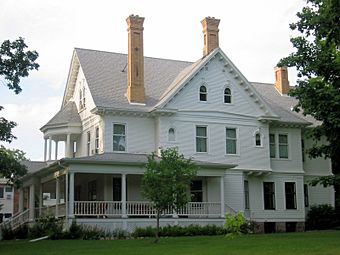Patrick Casey House facts for kids
Quick facts for kids |
|
|
Patrick Casey House
|
|

The Patrick Casey House from the southwest
|
|
| Location | 4th Street SE and 2nd Avenue SE, Aitkin, Minnesota |
|---|---|
| Area | Less than one acre |
| Built | 1901 |
| Architect | N.J. Holden |
| Architectural style | Queen Anne, Romanesque Revival |
| MPS | Aitkin County MRA |
| NRHP reference No. | 82002925 |
| Designated | April 16, 1982 |
The Patrick Casey House is an old and important house in Aitkin, Minnesota. It was built in 1901. The house mixes two cool building styles: Queen Anne and Neoclassical.
The first owner, Patrick Casey (1849–1910), was a very successful businessman. He was a partner in the Potter/Casey Company. This company was the biggest store chain in the area. The house was added to the National Register of Historic Places in 1982. It's important because of its unique architecture and its link to a key businessman in Aitkin. It's also one of the few special homes in northern Minnesota outside of bigger cities like Duluth.
Contents
The Story of the Patrick Casey House
Who Was Patrick Casey?
Patrick Casey moved to Aitkin when he was in his twenties. He first worked as a teamster, driving teams of horses in logging camps. He later met Warren Potter, who owned several stores. Potter hired Casey to manage his store in Grand Rapids.
When Potter's business partner retired, Casey became a partner. The company was then called the Potter–Casey Company. Together, they made it the top retail business in the region.
Family Life in the House
Patrick Casey married Elizabeth Emma Killeen in 1882. They had seven children. After Patrick Casey passed away in 1910, his wife Elizabeth lived in the house for many more years.
Later, she decided to move to a smaller home. She gave the house to the Benedictine Sisters of Duluth. In 1939, they opened the building as Maryhill Academy, which was a school.
Changes Over the Years
The Maryhill Academy school closed in 1968. The next year, some of the land around the house was sold. An apartment building was built there.
The Casey House was then used as a group home. First, it helped teenage girls. In the 1980s, it became a home for adults with mental disabilities. In 2001, the building was sold again. It was fixed up and became a single-family home once more.
 | Charles R. Drew |
 | Benjamin Banneker |
 | Jane C. Wright |
 | Roger Arliner Young |



